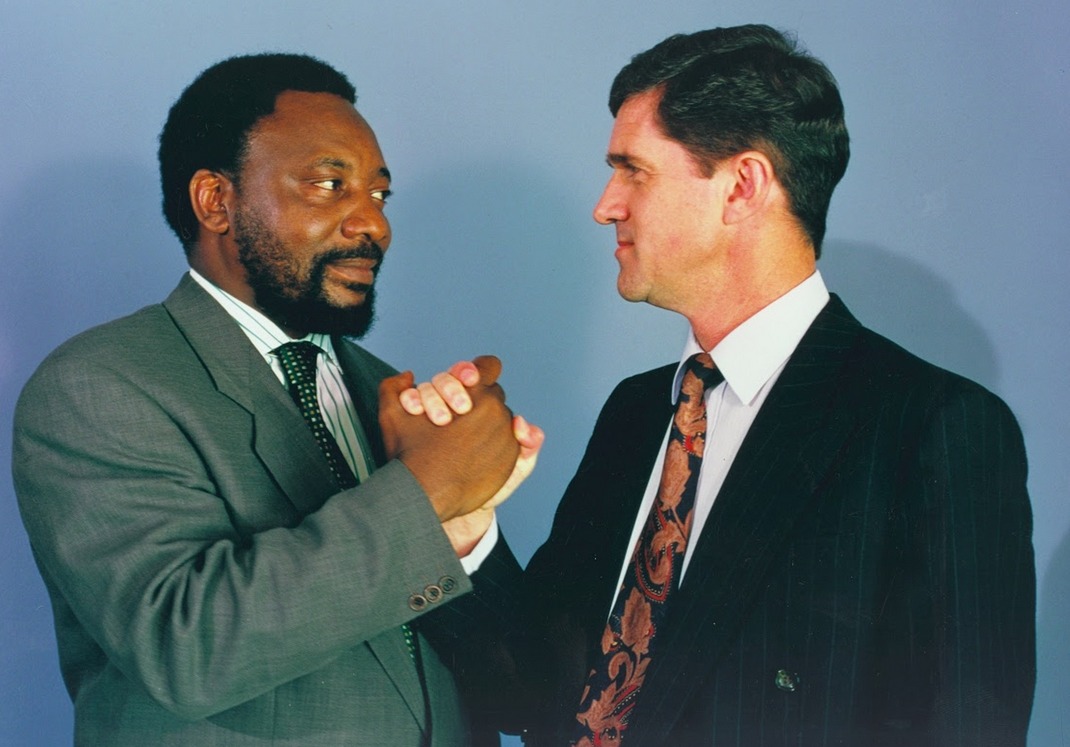Doctor of Philosophy (Honoris Causa) - jointly awarded
Roelof Petrus (Roelf) Meyer was born on the 16th of July 1947, in Port Elizabeth, Eastern Cape. He attended primary school in Kareedouw and Uitenhage, and senior school in Ficksburg where he matriculated in 1964. He completed his BComm and LLB degrees at the University of the Orange Free State where he served as chairman of the Students' Representative Council in 1969/1970.
In 1970/1971 he served as the national chairman of the Afrikaanse Studentebond. Roell Meyer was chairman of the Junior Rapportryers from 1976 to 1978. After winning a by-election in 1979, he entered parliament as the NP member for Johannesburg West. He was appointed Deputy Minister of Law and Order on 1 December 1986.
In 1988 he became Deputy Minister of Constitutional Development and Planning and after the 1989 election, was appointed Deputy Minister of Constitutional Development and of National Education. Following the unbanning of the ANC and the release of Nelson Mandela in February 1990, he formed part of the government delegation to the Groote Schuur talks with the ANC.
He continued to play a key role in the negotiation process and was relieved of his education portfolio in order to continue with this role. When the cabinet was reshuffled in 1991, he was appointed Minister of Defence and Communication. On 1 June 1992 he replaced Gerri! Viljoen as Minister of Constitutional Affairs and Communication. He took over as the government's chief negotiator in 1993. At present Roell Meyer is Minister of Provincial Affairs and Constitutional Development in the Government of National Unity.
Matamela Cyril Ramaphosa was born in Johannesburg in 1952. He grew up in Western Township and Soweto and later matriculated at the Mphaphuli High School in Sibasa, Northern Transvaal, in 1971. He studied for a BProc degree at the University of the North but his studies were interrupted when he was detained for eleven months for anti-apartheid political activity. In 1974 he became chairman of both the University branch of the South African Students Association {SASO) and the Student Christian Movement. After his release from prison Cyril Ramaphosa became active in the Black People's Convention.
Following the 1976 Soweto uprisings, he was again detained, this time for six months. After his release he studied through UNISA and obtained his BProc degree in 1981, completing his articles in the same year. Instead of going into legal practice, however, he joined the Council of Unions of South Africa (CUSA). He went on to become the Secretary General of the National Union of Mineworkers (NUM). He was prominent in the formation of COSATU and delivered the keynote address at its inception in December 1985. In 1987 he received the Olaf Palme Prize in Stockholm. In the late eighties he also played a crucial role in the UDF/MDM.
In his capacity as Secretary General of the African National Congress, a position he has held since July 1991, Cyril Ramaphosa became head of the negotiations commission of the ANC, and led the ANC delegations at both CODESA and the multi-party negotiations which followed. In 1994 he became a member of the Management Committee of the Transitional Executive Council. Cyril Ramaphosa is currently the cochairman of the Constituent Assembly.
Motivation for the award of these honorary doctorates
The two figures, Roelf Meyer and Cyril Ramaphosa, feature prominently in the history of South Africa's transformation from apartheid to democracy. They are internationally accredited for their join efforts in the consitutional negotiation process which prepared the way for South Africa's first democratic e!ections. It was largely through the commitment of these two individuals that the negotiation process was sustained through a number of extremely difficult crises. By their firm commitment to the process and the established principles of negotiation, and by their frequent demonstrations of political restraint, these leaders succeeded where their predecessors failed.
While sharing the attitude that all problems can ultimately be resolved in an amicable fashion, both men have demonstrated an ability to maintain a working relationship despite important political differences. In this way, they are a shining example to all South Africans, and provide a vision for all, underlining the value of the negotiations which continue to taall, take place at all levels and in all sectors of South African society.
They paint a picture of politics being "the art of the possible", in the most positive sense of that phrase. These are qualities of statesmanship which will be of inestimable value to our country in the challenging years that lie ahead.
It is appropriate for this University, committed to its own programme of negotiated transformation, to recognise the efforts of those who contributed towards the realisation of these values and demonstrated these skills on a national scale.
The University of Port Elizabeth therefore awards the degree Doctor Philosophiae (honoris causa) to Roelf Meyer and the degree Doctor Philosophiae (honoris causa) to Cyril Ramaphosa. These awards serve as recognition of their political courage and achievements and as a statement of the University's commitment to a democratic South Africa and to the culture of negotiation.
